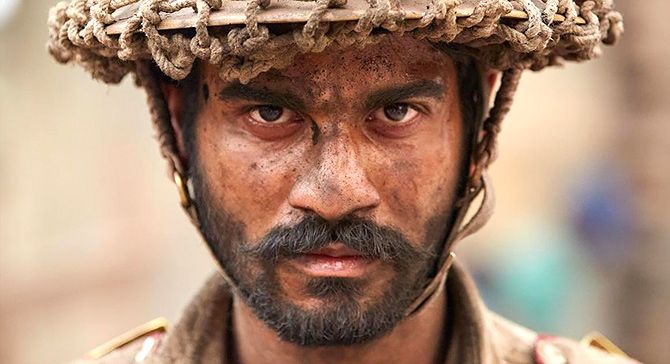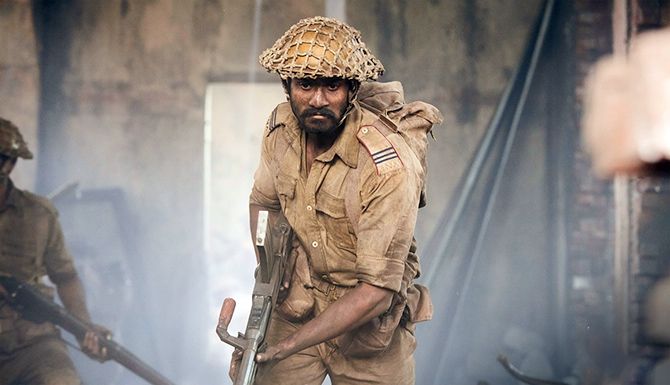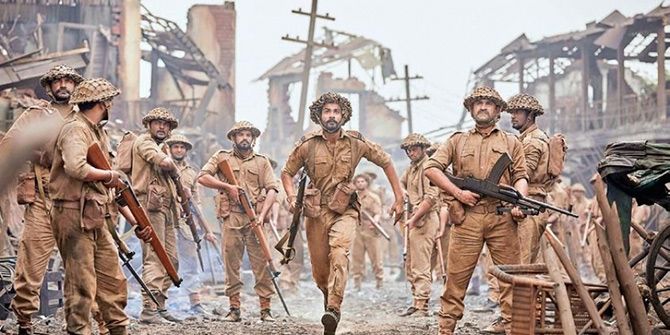 | « Back to article | Print this article |
'What was previously buried in the sands of time now gets buried by the weight of banality,' notes Sreehari Nair.

Each episode of The Forgotten Army opens with Shah Rukh Khan's earnest-sounding voiceover giving you a few bare facts about the Azad Hind Fauj.
After all, what good is an Indian superstar who can't pass off as a historical guide for the uninitiated?
If the magnitude of the setting overwhelms you still, worry not, because Director Kabir Khan's there to handhold you at every step.
The characters in his drama are mostly composites of real-life figures placed into a cute little plot, with their feathers nicely smoothed.
Surinder Sodhi (played by M K Raina) is a 70-something man, who visits Singapore in 1996 and who, with a nephew in tow, retraces the journey he had made and the geographies he had covered as a soldier with the Azad Hind Fauj in the years 1942-1945.
If Sodhi, one can assume, is a composite of Prem Sahgal, Gurbaksh Singh Dhillon and Shah Nawaz Khan, then the nephew, Amar (played by Karanvir Malhotra), may very well be a stand-in for a younger version of Kabir Khan: A boy so liberal that the smallest evidence of injustice or sacrifice has the effect of pushing him to the edge of tears.
Old Sodhi has visions of the past, when he was initially a soldier with the British Indian Army and later a part of the Japan-backed Azad Hind Fauj, and when between gunfire and conquests he would exchange moony eyes with Maya Srinivasan (who, Kabir Khan has confirmed is yet another composite of Lakshmi Sehgal and Janaki Athi Nahappan).
In addition to the Sodhi-Maya affair, there is at least one more unfulfilled romance here, and the running theme seems to be: 'We were so busy fighting the British, we didn't have enough time for love.'
The direct outcome of packing the narrative with so many composites and making them float in a saccharine pool is that poor Subhas Chandra Bose -- who mostly meant business -- is reduced to some long shots, a sound bite, and finally a portrait.
Bose is a plot-device here, the invisible force causing the faces on this show to glow with national pride, a pride which they profess against flawless, sun-soaked backdrops.

So single-minded is Kabir Khan in his desire to make this ride an uncomplicated one that he swiftly wipes out the big conundrum that the 'real officers' of the Azad Hind Fauj had to reconcile with: Killing soldiers of the British Indian Army would have meant killing fellow Indians.
In what must be a lesson for future screenwriters, Khan gets young Sodhi (played by Sunny Kaushal) to quote a righteous passage from the Bhagavad Gita and the grand historical conundrum, which has stayed unsolved these last 77 years, is resolved in a matter of seven seconds.
In The Forgotten Army, Kabir Khan has essentially found a way to cut down the story of the Azad Hind Fauj to a manageable size.
He has taken what was menacing and crazy and uncontrollable about the Fauj's history and presented it to us in its most sincere, homogenised and digestible form, ready for mass consumption.
Tigmanshu Dhulia's film about the Red Fort Trials, Raag Desh, with its unsettling humour and its freewheeling characterisations of hallowed historical figures, had internalised the truth that the Azad Hind Fauj mission was a fool's errand at some level (In a way, this is what conferred upon the mission, permanent greatness).
Dhulia's hip film seemed crafted by a man whose madness was equal to the subject he was taking on, whose excesses at times seemed too much for the medium to sustain.

Kabir Khan's sanitised, polished, safe effort is closer to those harmless history textbooks of our childhoods -- textbooks that were to actual history what B R Chopra's Mahabharat was to its original source.
What Khan has done here is taken 'a scream of ambition' and recounted it to us in clipped, measured speech.
This is art created out of a folklore's immediate appeal, created by flattening the folklore and embroidering it with an anecdote or two.
What it lacks unfortunately is a visionary artist's wholesome penetration of the folklore so that fresh and surprising meanings are revealed.
The Forgotten Army serves as such a clear signpost of Kabir Khan's artistic sensibility that, while watching it, I could guess what sort of chestnuts would make up his forthcoming movie, 83.
For instance, I could foresee an 83 anthem playing out at different points in the movie -- especially during a scene of a dejected Kapil Dev being consoled by his supportive wife (you know, just so that the executive decision of casting Deepika Padukone as Romi Dev is justified without disturbing the sanctity of the folklore at hand).
Kabir Khan is that kind of film-maker: Efficient, tasteful, dignified, mostly in control, and for these very reasons, also impersonal. My guess is that he would be a perfect choice for making biographies of great men, aimed at appealing to 10 year olds.
Such efficient, impersonal, film-makers are not without their strengths however, as proved here.
Khan has mapped out the scenes of combat proficiently, paying close attention to the compositions and to the actors's movements.
There is one sequence in particular that stands out, of Japanese soldiers entering Singapore on bicycles.
That wordless stretch, filled with the promise of oncoming doom, puts you right in the centre of combat. And given that it follows a brutal rape scene, the fleet of murdering cyclists assumes a spooky texture.
But once Kabir Khan is done photographing such rousing scenes of combat and settles down into explicitly showing us the horrors of war, an air of solemnity begins to hang over the proceedings.
Though phrases such as 'the dehumanising effects of war' sound pretty, the bare bones fact is that a soldier has to be at least momentarily dehumanised or he has to tap into his own bloodlust in order to kill another soldier.
This is the nature of the game that they call War.
And so, here, after a combat scene, when Khan pipes in a sentimental alaap or an inspirational town-hall speech, the dramatic choice, oddly enough, ends up diminishing the meaning of the gore-scarred environment.

Between its many missteps, The Forgotten Army is enlivened sporadically by three characters, and by the arresting screen presence of those playing these characters.
Sunny Kaushal (as Surinder Sodhi), Rohit Chaudhary (who plays Arshad, Sodhi's confidante) and Sharvari Wagh (as Maya Srinivasan) are skillful young actors.
More importantly, however, they show a talent for addressing extreme emotions and physical states -- idealistic fervour, fear, pain and exhaustion -- with great ease.
There's one scene I especially liked, involving Wagh, Choudhary, and Kaushal, set in a town square, where light seemed to be bouncing off the actors's teeth, and the cameras appeared to be smiling at their relaxed improvisations.
That scene offered a kind of pleasure I had not bargained for, but it was a pleasure I accepted nonetheless because it seemed to expand the scope of the characters and the scope of their world.

If there is a larger grievance that underlines my above rants and vents, it is that The Forgotten Army, as a patriotic film, simply attempts to deliver the goods of the genre -- which, given the mood of the country, somehow feels not enough.
And so I will, at this point, amble my way to the key question: Have we, as a nation, defined patriotic movies and consequently patriotism, too narrowly, too sentimentally?
Those who share my political ideals, that is to say the Liberals, were recently heard applauding Rajkummar Rao for turning down an offer to act as Nathuram Godse.
The applauders feared that the resulting movie would be yet another invasion upon our sacred past. (I agree that a movie which glorifies Godse and turns him into a masala patriot is doubtless yet another example of the current Hindutva-isation of the Indian history.)
But what, O fellow Liberals, do most of you cite as the model for the Indian patriotic film?
It is Attenborough's Gandhi, a movie which completely overlooks aspects such as Gandhi's shrewd politics, his ready humour, how astute his instincts were, and instead paints a picture of such absolute saintliness that it cannot be argued against, it is so spotless.
So if Attenborough's Gandhi is our model indeed, then we have reduced the debate around the depiction of patriotism in movies to a Battle of Pieties.
We are saying, in effect, that Our Pieties are greater than the Pieties of the Right Wing.

But let's just suppose the purpose of the Indian patriotic movie was to not preserve our roots, but to explore our roots.
Suppose our idea of patriotism, and the goal of our patriotic art, was investigating generously what it means to be an Indian.
What if patriotism meant trying to recreate our mythologies using lived in details and not through this business of assigning sacredness to some and conferring evil upon the rest?
Suppose our patriotic movies were open to the idea that our reputable heroes could have foibles too?
Or that the villains of our bureaucratic records could have been misplaced dreamers also?
Now, with these sensibilities in place, suppose some real artist does make a film on Godse -- not to expiate his sin, not to condone his action, not to celebrate the man, but only so that we are granted access to the psyche of this Indian who believed that his pitiful act was in the larger interest of our country.
What if we managed to pull off such a film?
Suddenly, Godse stops being just a cockroach who assassinated our greatest leader, and he becomes also a tragic figure who suffered from delusions of grandeur. He is a proxy now for those millions of Indians who are being eaten up by their belief that they deserve to be a much bigger force, in the workings of this country, than what they presently are.
We have got a bit closer to the Indian Character, the Indian Paranoia, and the Indian Dream -- can an Indian artist hope to perform a greater act of patriotism?
It is time to evolve the Indian patriotic movie from figures to real people, from the two-dimensionality demanded by our history textbooks to the three-dimensionality that only ambitious art can afford.
It's in such a scenario that Kabir Khan tries to evoke a chapter of the Indian history through his excessively sentimental eyes.
Khan raises The Forgotten Army to the level of our most overused myths.
The result? What was previously buried in the sands of time now gets buried by the weight of banality.

Sreehari Nair wishes to write about that which is in the cultural air but absent from trending lists. He can be reached at sreeharin@rediff-inc.com